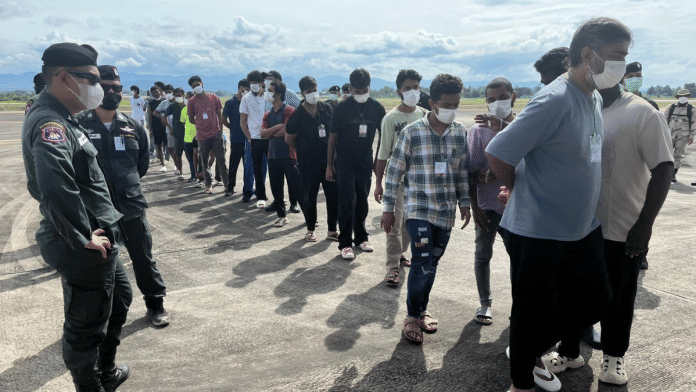New Delhi: Twenty-four-year-old Pradeep Vijay from Maharashtra believed he had landed a data entry job in Myanmar. Instead, he found himself trapped in a shady compound in Myawaddy, under the unrelenting watch of the Border Guard Forces, a pro-military militia, and forced to run fake crypto schemes for three years targetting Indian expatriates.
He endured beatings, psychological abuse, and unending work hours. His family eventually paid a ransom of ₹10 lakh to secure his release, but it was a Myanmar military raid that finally freed him along with others. And last week, he was on board one of the two Indian Air Force special planes that brought back 270 such Indians.
According to sources in the Indian security establishment, between January 2022 and May 2024, at least 29,466 Indians travelled to Cambodia, Thailand, Myanmar, and Vietnam on tourist visas and did not return. Sixty were rescued in April 2025 and 549 the month before.
Embassy of India, Bangkok and Consulate of India in Chiang Mai in close coordination with various agencies of the Royal Thai Government have facilitated repatriation of 270 Indian nationals, including 26 women, from Mae Sot, Thailand to India by two special flights operated by… pic.twitter.com/aRPJPf9Gu7
— India in Thailand (@IndiainThailand) November 6, 2025
According to sources, workers are initially lured via social media platforms such as Telegram, Facebook, or WhatsApp, where recruiters or local agents advertise lucrative overseas jobs in IT, data entry, or digital marketing sectors. Agents often present fabricated employer profiles, WhatsApp/Telegram testimonials, and promise to arrange visas/tickets for workers.
The workers are then asked to pay the agents a commission, in some cases reported in the range of ₹1-1.5 lakh, for what appear to be legitimate travel arrangements. The agents then handle their visas and flights, and hand them over to the next-stage controllers in Thailand or the Myanmarese town of Myawaddy. They are then taken to Bangkok on tourist visas and moved across the border to Myanmar, where they are taken to compounds run allegedly by organised gangs or militias. It’s one-way traffic into the compounds.
Once inside, their passports and phones are confiscated. Survivors recall they were compelled to run investment scams, “digital arrest” operations and impersonation fraud under the supervision of armed rebels and threat of violence. They are under constant monitoring, and grueling work hours often exceed 18 hours a day with no weekly breaks.
Those who resist are subjected to severe torture. Survivors also report having their nails pulled out, being confined for days without food, and being subjected to electric shocks. The report shared by sources carries testimonials from three such individuals.
Satish, a restaurant manager from Maharashtra, said he was sold to a compound where guards beat him up for crossing legs, his salary was docked, and his nails were pulled out. He endured 18-hour shifts in the guarded compound run by armed rebels. “We were sold for $5,000… beaten up if we refused (being sold),” he was quoted as saying.
As ThePrint reported earlier, a series of such scam hubs operate in Myanmar’s border areas, holding thousands of workers. While China has cracked down on scam hubs along its Myanmar border, neither China nor Thailand acted against operations on the Thai-Myanmar border. Pressure from China and Thai politicians led Thailand to cut power and communications to the compounds, restrict banking access for scam bosses, and issue arrest warrants for militia leaders, prompting some compounds to evacuate workers.
Once they were rescued, they were taken to camps in Bangkok where they contacted their family members.
Also Read: A digital arrest kingpin tells all: Chinese syndicates, Cambodian scam farms & the perfect trap
Syndicate of scams
KK Park, one such cybercrime compound on the outskirts of Myawaddy, was one of the largest scam operations in the region before it was raided by Myanmar’s military in mid-October. The crackdown led to a mass exodus, with more than 1,500 people from 28 countries fleeing across the border into the Thai town of Mae Sot.
Local reports suggest that, among them were 465 Indian nationals, along with citizens of China, the Philippines, Vietnam, Ethiopia, Kenya, and several other countries.
The group of Indians reportedly entered Thailand illegally and were detained by authorities for violating immigration laws after they crossed the border late last month.
In July last year, the External Affairs Ministry raised the issue with Myanmar’s Foreign Ministry, calling for swift return of Indians unlawfully detained in the country and calling for stronger action against cyber scam networks. “In India, we have sought the blocking of websites that advertise such jobs and have recommended prosecution in certain cases involving individuals connected to these activities,” EAM S. Jaishankar had then said.
The Indian Embassy in Bangkok said it is continuing to coordinate with both Thai and Myanmar authorities to secure the release and return of other Indian nationals still trapped in scam centers. In a statement, the embassy warned Indian citizens to verify the credentials of overseas employers and recruitment agencies before accepting job offers abroad. It also cautioned travellers that visa-free entry to Thailand for Indian passport holders is intended strictly for tourism or short business visits and not for employment.
(Edited by Ajeet Tiwari)
Also Read: China wants to create new order in Myanmar. India must switch gears or be dealt out of the game






